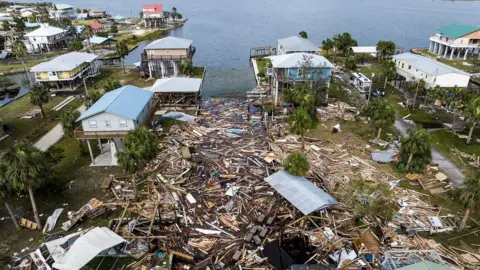Study suggests climate change may have exacerbated Hurricane Helene’s impact
Experts see likely increase in annual global proportion of Category 4 or 5 tropical cyclones
By Huella Zero
The devastating impact of Hurricane Helene, which caused more than 200 deaths in the United States and millions of dollars in losses, was exacerbated as a result of climate change, warned a study by researchers at ClimaMeter.
A study published by the organization analyzed that Hurricane Helene was a unique event. It is also the second deadliest hurricane of this century. These types of cyclones leave up to 17 millimeters of rain per day (an increase of 20%) over the southeastern United States; with winds of up to 5 km/h (7% more than in previous times) in the Gulf of Florida.
The authors of the study see it likely that natural climate variation has influenced the increase in rainfall and wind speed, but consider that human activity also contributed.
Extreme rainfall caused by Helene
On September 25, the National Hurricane Center upgraded Helene to hurricane status and gave it that name as it entered the Gulf of Mexico. Helene made landfall and hit Florida’s Big Bend as a Category 4 hurricane and quickly began to advance toward the southeast of the country, where despite having lost hurricane status it caused great damage.
“The most serious impacts were caused by the extreme rainfall that affected Florida, the Carolinas, Georgia, Tennessee and Virginia, with a provisional maximum accumulation of 751 mm recorded in Busick, North Carolina,” ClimaMeter said.
The organization detailed that this episode of extreme rainfall occurred due to the interaction of an atmospheric river that pushed Helene from the Gulf of Mexico towards the Appalachian mountain range, where the orographic elevation exacerbated the meteorological conditions.
Precipitation totals were also elevated by rainfall that occurred before Helene made landfall, a phenomenon known as a “precursor rainfall event.”
ClimaMeter said that although studies are still needed to confirm this, it suspects that unusually high heat in the Gulf of Mexico contributed to the intensification of Helene and, consequently, caused the extreme flooding over the southeastern US.
According to the Intergovernmental Panel on Climate Change (IPCC) report, cited by ClimaMeter, climate change has increased the observed rainfall, winds, and storm surge associated with some tropical cyclones; and there is likely to be an increase in the annual global proportion of Category 4 or 5 tropical cyclones.
The IPCC report also suggests that climate change has had an impact on hurricane intensity and associated hazards, but the level of confidence in these results varies. The organization also highlighted the economic damage caused by individual extreme events, and recent studies – with different approaches – attribute this damage to climate change.
After a hurricane, it is crucial to take steps to protect yourself and your family
Personal Safety
● Stay informed: listen to local news and follow instructions from authorities.
● Avoid damaged areas: do not enter damaged buildings until authorities allow it.
● Wear sturdy footwear: avoid cuts from debris.
● Be careful with electrical wires: do not touch fallen wires or come into contact with wet electrical objects.
● Use insect repellent: protect yourself from mosquito-borne diseases.
Housing and Environment
● Check for structural damage before entering your home. Make sure there is no damage to the roof, walls or foundation.
● Check gas, water and electrical installations. Repair any leaks or damage before using them.
● Remove standing water and disinfect areas affected by flooding.
● Throw away contaminated food: Throw away anything that came into contact with dirty water.
● Document damage: Take photos so you can file a claim with your insurance.
Health
● Drink safe water: Boiled or bottled.
● Wash your hands frequently with soap and water.
● Use a first aid kit to treat minor injuries.
● See a doctor if you have symptoms of flood-related illnesses.




